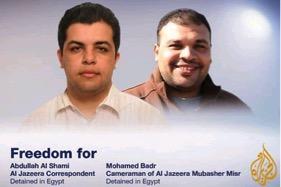Independent Press verbal, theoretical in Sisi’s Egypt
Submitted by fkakooza on

Independent journalism based on truth, balance, fairness and justice under the Egyptian leadership of army general-turned politician Abdel Fattah El Sisi is not welcome.
However, media houses that restrict themselves on reporting about social issues, business, sports, the environment and other areas not commensurate with state activities are allowed to practice their independence, but heavily monitored by the state.
For instance; reporting on critical issues regarding trading in mineral resources between Egypt and the outside world is subjected to high level surveillance and censorship. Reporters are told what to say and they have to toe the government's line.
Egypt is today ranked among the top violators of press freedom in the world, according to 2022 Reporters Sans frontieres (RSF), which is contrary to what is enshrined in Article 48 of the country's constitution that emphasizes freedom of the press, printing, publication and mass media.
Interviewed for this publication, Rosha Allam, the assistant professor of Journalism and Mass Communication at the American University of Cairo, noted that Egypt's media laws should be revised to ease the power grab of independent media.
“To limit state intervention, many laws need to be revised to enable the environment for an independent media system, and limit grasp of power on the media performer,” said Prof. Allam.
She adds that Egypt lacks the access to information law, because calls by the civil society to enact such legislation have continuously landed on deaf ears of the government.
The government of President el Sisi has thus made Egypt a very dangerous environment for objective journalism. Tens of journalists are still behind bars without trial due to the vaguely defined charge of terrorism by the state laws. Cases in a point are activists; Hisham Fouad and Hossam Moanis who were in 2021 sentenced to four years for spreading false news about Egypt to the outside world.
Sherif Mansour, Middle East and North Africa Program Coordinator for the Committee to Protect Journslists (CPJ) described the sentencing of Hisham Fouad and Hossam Moanis as unacceptable, and called for their immediate and unconditional release. They remain in jail as at the time of compiling this report.
In 2021, Egypt was ranked 166th out of 180 nations in the World Press Freedom Index.
A January 2023 report by Reporters Without Borders (RSF) lists 570 journalists and media workers in prison in different countries across the globe. Another report in 2022 listed the Sisi government as a top jailer of journalists with more than 70 journalists in detention. The government has targeted independent news outlets for closure, and blocked over 500 websites, including those related to disseminating information, a campaign that started in 2017, when government began blocking critical internet content.
Media has thus been pushed to disseminate state narratives, avoid reporting controversial subjects or risk closure. Ordinary citizens who express anti-government sentiments on social media have also been thrown behind bars.
Dr. Hussein Amin, a senior lecturer of Journalism and Mass Communication at the American University of Cairo, says that efforts by the government of President Sisi to have press activities under strict control is a proactive move to maintain the Islamic moral fabric and ensure stability in the North African State.
"Any country facing psychological warfare, challenged by fourth generation warfare, subjected to deep fake news, and surrounded by failed states, and civil wars must develop a strong media policy considering all these challenges, to be able to preserve national and cultural identity of the county," said Dr. Amin.
Allan Aturinda, a videographer working for the BBC Kampala, in a phone interview also seemed to toe Dr. Amin's line. He said that the Sisi administration, like any regime threatened by internal and external forces will try to crack down on anything threatening its survival.
Listen to Allan Aturinda here
https://on.soundcloud.com/g7Xax
Soon after taking over power in 2013, President Sisi ordered the closure of four TV stations including Aljazeera-Mubasher, Misr, Ahrar 25, al Quds & al-Yamuk. The government labeled them sympathizers of the Muslim Brotherhood, an Islamist religious, political and social movement which had supported Muhammed Morsi to rise to power.
The government also ordered the shutting down of two newspapers, and almost all nine privately owned pro Morsi TV stations airing out in Egypt. Many employees and owners of these stations were arrested and detained, including their close allies for being sympathetic to the Muslim Brotherhood.
In 2014, Sisi invited the media fraternity in his residence and lectured them about how the media could be used to unify the nation still recovering from the effects of the 2011 uprisings which forced long-serving leader, Hosni Mubarak, to resign. A group of Egyptian journalists and editors were then asked to sign a declaration to reduce their criticism of government.
President Sisi in January 2015 passed a supreme order giving the Prime Minister unprecedented powers to ban any foreign publications offensive to religion. Following this decree, government in 2018 banned BBC for publishing false news after it ran a documentary featuring human rights abuses by security agencies. In 2018, the Sisi government also banned four different entertainment programmes on the basis of immorality.
One of the most lethal weapons against press freedom, for instance, is the 2015 Anti-terrorism law which forbids journalists from disseminating information about terrorist attacks. The 2018 cyber-crime law restricts free speech.
In 2018, the Supreme Council for Media Regulation (SCMR) was instituted, which limits the operational capacity of media institutions and institutes perilous registration requirements for entities seeking to be recognized by the state. Headquartered in Maspero, which also houses the state broadcasting company, the body is directly controlled by government.
Calls by international human rights organizations to force the Sisi administration to comply with the right to freedom of expression have not yielded much as the notion of independent press remains verbal and theoretical.
- 813 reads
